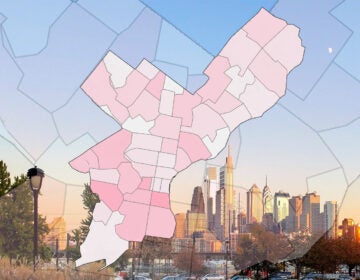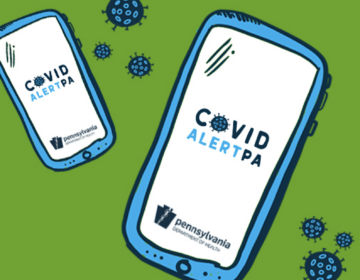Pa. coronavirus update: With COVID-19 cases steadily rising, state records record high on Thanksgiving
As COVID cases rise, hospitals are making plans in case they begin running short of beds. If certain benchmarks are hit, elective surgeries may be curtailed.

A man walks through the 30th Street Station ahead of the Thanksgiving holiday, Friday, Nov. 20, 2020, in Philadelphia. With the coronavirus surging out of control, the nation's top public health agency pleaded with Americans not to travel for Thanksgiving and not to spend the holiday with people from outside their household. (AP Photo/Matt Slocum)
Ask us about COVID-19: What questions do you have about the current surge?
On Thanksgiving, Pennsylvania recorded its highest-ever single-day count of new coronavirus cases: 8,425. It’s part of a steady trend of ever-rising cases.
The state Department of Health announced that number Friday at noon, along with the current day’s count. Together, the two days brought at least 15,785 new cases, as well as a spike in hospitalizations.
Just two months ago, fewer than 500 people were hospitalized with COVID-19. That number now stands at 4,087. Of those people, most are 65 or older, and 877 are in intensive care units, the Health Department said in a release.
Between 11:59 p.m. Wednesday and 11:59 p.m. Thursday, 21 people were reported dead of coronavirus. Total fatalities attributed to the virus since the start of the pandemic in Pennsylvania number 10,234.
In Philadelphia, officials have reported 1,614 new confirmed cases over the last two days, plus eight probable cases after rapid antigen tests. The city has also confirmed three additional deaths from the virus.
The Philadelphia Department of Public Health also reported 739 COVID-19 patients are currently being treated in city hospitals, and 72 are on ventilators.
As cases rise, hospitals across Pennsylvania are making plans in case they begin running short of beds.
If they hit certain caseload benchmarks, the state has ordered hospitals to cut back on elective surgeries — which also happen to be a major way that hospitals make money. A halt to elective surgeries and corresponding revenue loss at the start of the pandemic was one of the primary reasons why hospitals received so much federal stimulus money.
For elective procedures to be stopped, two of three potential triggers have to occur: a third of the hospitals in a region have to anticipate staffing shortages, a more than 50% increase in COVID-19 case admissions must be projected, or 90% of beds must be expected to be filled.
In light of the record case numbers, the state is stressing all possible mitigation measures.
“Mask-wearing is required in all businesses and whenever leaving home,” the Department of Health said in a statement. “Consistent mask-wearing is critical to preventing the spread of COVID-19.”
The commonwealth has been under a stay-at-home advisory since early last week, and the Health Department has also issued updated travel guidance as well.
People ages 11 and older who arrive in or return to Pennsylvania are instructed to have evidence of a negative COVID-19 test, and if they can’t, they have to quarantine for 14 days after entering. They can stop quarantining if they get a negative test in that time. People returning to the state after leaving for less than 24 hours are exempt, as are people complying with court orders.
The travel rules do not come with any specific enforcement measures. State Health Secretary Rachel Levine urged Pennsylvanians to cooperate with the guidance in the interest of public safety.
Officials are sending push alerts with pandemic-related updates and warnings directly to residents’ cell phones through the national Wireless Emergency Alert system.<a id=”Section1″></a>
Plus, the state has rolled out a raft of new coronavirus mitigation efforts aimed at businesses and schools. They can now be penalized if they don’t enforce mandatory mask-wearing while indoors. In addition, employees who can work from home must do so, indoor gatherings are capped at 10% of capacity, or 500 people maximum, and schools in high-infection areas with in-person instruction have to prove that they’re following safety measures. The state temporarily halted alcohol sales in restaurants and bars the night before Thanksgiving — generally Pennsylvania’s biggest drinking night of the year.

Get daily updates from WHYY News!
WHYY is your source for fact-based, in-depth journalism and information. As a nonprofit organization, we rely on financial support from readers like you. Please give today.




![CoronavirusPandemic_1024x512[1]](https://whyy.org/wp-content/uploads/2020/03/CoronavirusPandemic_1024x5121-300x150.jpg)


